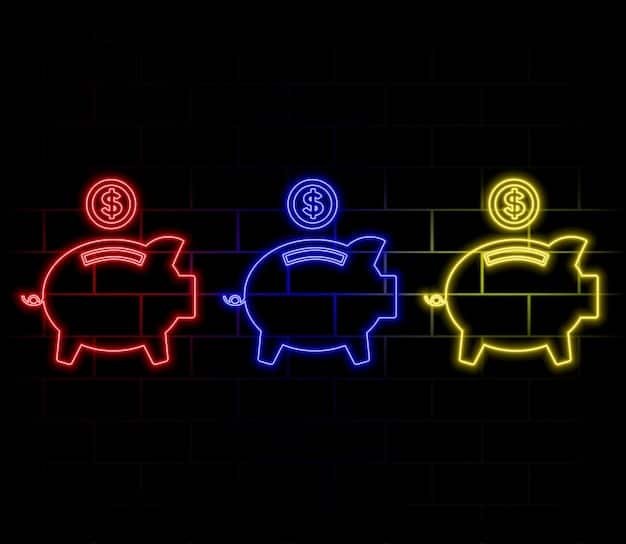The Impact of Universal Basic Income on US Personal Finance in 2025

Universal Basic Income (UBI) proposals are projected to significantly reshape personal finance in the US by 2025, offering a guaranteed income floor that could impact savings, investment, employment, and overall financial stability for millions of Americans.
The concept of Universal Basic Income (UBI) has gained considerable traction in recent years, and proposals for its implementation are being seriously considered in the United States. As we look toward 2025, it’s crucial to examine how UBI could impact personal finance for individuals and families across the country.
Understanding Universal Basic Income (UBI)
Universal Basic Income (UBI) is a government program where every citizen receives a regular, unconditional sum of money, regardless of their income or employment status. The primary idea is to provide a safety net that ensures people can meet their basic needs. This section provides a foundational understanding of UBI concepts and principles.
The Core Principles of UBI
UBI is based on several key principles, including universality, regularity, and unconditionality. Each principle plays a vital role in defining the framework and potential impact of the program.
How UBI Differs from Existing Welfare Programs
Unlike traditional welfare programs, UBI is not means-tested and doesn’t require recipients to meet specific criteria or work requirements. This streamlining aims to reduce bureaucratic overhead and eliminate the stigma associated with receiving assistance.
- Universality: Payments go to all citizens, fostering inclusivity.
- Regularity: Consistent income aids budget and financial planning.
- Unconditionality: No strings attached promotes individual agency.
Implementing UBI will bring changes. By understanding its fundamental concepts and how it breaks from traditional strategies that assist the population, we can engage in conversation about the far-reaching economic and social consequences to come.
Projected Impact on Savings and Investments
One of the most significant possibilities for the presence of people’s financial lives due to universal basic income will be related to savings and investments. Having a constant source of income could provide families with the economic stability they need to invest and save. We might see people’s attitudes toward the stock market and towards accumulating wealth change as a result.
Increased Savings Rates Among Lower-Income Households
With a guaranteed income floor, lower-income households may find it easier to save for emergencies, education, or retirement. This increase in savings could lead to greater financial security and upward mobility.
Shifts in Investment Strategies
UBI could also influence investment strategies. With basic needs covered, individuals may be more willing to take calculated risks in pursuing entrepreneurial ventures or investing in higher-growth assets.

Changes in savings habits brought on by UBI could also have far-reaching implications for the economy as a whole, driving up demand, spurring investment, and fostering long-term economic stability.
The Changing Landscape of Employment and Income
UBI is expected to disrupt traditional employment norms by offering people the option of freelancing, furthering their education, or caring for family without being financially crippled. The presence of a basic income floor can motivate workers to demand better pay and working conditions, potentially resulting in a restructuring of many sectors.
Potential Effects on Workforce Participation
Some worry that UBI could disincentivize work, leading to a decline in workforce participation. However, research suggests that the impact might be minimal, with many people continuing to work to supplement their basic income.
Opportunities for Entrepreneurship and Skill Development
UBI could provide a safety net that encourages individuals to pursue entrepreneurial ventures or invest in skill development. This could lead to positive outcomes, such as job creation and innovation.
- Greater Job Satisfaction: Empowered workers demand better terms.
- New Business Creation: Extra capital helps launch startups.
- Upskilling Opportunities: Invest in education and training.
Overall, UBI might encourage a move toward freelancing, entrepreneurship, and lifelong learning, changing the way individuals approach their careers and financial security.
Impact on Debt Management and Credit Access
The implementation of UBI can have big effects on how Americans manage their debt and reach for and obtain credit. Decreasing debt loads and providing better access to affordable credit can dramatically improve people’s financial well-being.
Reduced Reliance on High-Interest Loans
With a guaranteed income, individuals may be less likely to turn to high-interest loans to cover essential expenses. This could help them avoid debt and improve their financial stability.

Improved Credit Scores and Access to Mainstream Financial Services
UBI could also lead to improved credit scores, making it easier for people to access mainstream financial services like mortgages and car loans at favorable rates. This shift toward better credit access can further reduce income inequalities and boost financial inclusion.
UBI has the ability to reshape the debt landscape and encourage financial access for all by providing people with economic security. These changes can have a big influence on financial literacy, economic mobility, and general financial well-being.
Housing and Living Expenses in 2025
Another crucial aspect to consider when evaluating the impact of UBI on personal finance is its potential effect on housing and living expenses. As individuals receive a regular, unconditional income, shifts in demand for housing and other essential goods and services may arise.
Effects on Housing Affordability
UBI could influence housing affordability by increasing demand, particularly in urban areas. Policymakers would need to address this issue by implementing measures to increase the supply of affordable housing.
Changes in Spending Patterns
With a guaranteed income, people may reallocate their spending toward essential goods and services. This could lead to shifts in demand and price dynamics across various sectors.
- Increased Demand: Focus on services to increase demand for important products and services.
- Price Dynamics: Monitor changes in costs and implement regulations.
- Affordable Housing: Invest in housing in response to increased needs.
Analyzing those shifts in housing affordability, spending patterns, and the bigger consequences for US families’ financial well-being will enable policymakers to make wise decisions that optimize the positive consequences of UBI while diminishing its downsides.
Navigating Taxes and Government Benefits with UBI
When designing the implementation of UBI programs, it’s vital to carefully consider how UBI interacts with present tax laws and other government benefits. How effectively UBI is integrated with other financial support structures may have a big impact on program results and financial results for persons receiving assistance.
How UBI Might Affect Tax Liabilities
Depending on how UBI is structured, it could be subject to taxation, which could affect the net benefit received by individuals. Policymakers must consider the tax implications to ensure that UBI effectively reduces poverty and income inequality.
Coordination with Existing Government Programs
To prevent redundancy and inefficiencies, UBI should be carefully coordinated with existing government programs like Social Security, Medicare, and SNAP. Policymakers should assess whether to phase out certain programs or integrate them with UBI.
Careful consideration of tax implications, cooperation between programs, and efficient design will be needed for optimum effect and proper impact of UBI programs. Policymakers can boost effectiveness and guarantee equitable outcomes.
| Key Aspect | Brief Description |
|---|---|
| 💰 Savings | UBI could boost savings potential among lower-income people. |
| 💼 Employment | UBI could permit people to pursue new professional possibilities, or pursue new educational opportunities. |
| 🏠 Housing | UBI may push a shift in spending habits that has consequences for housing expenses/costs. |
| 💲 Taxes | UBI implementation needs thorough tax and government benefits integration. |
Frequently Asked Questions
▼
▼
▼
▼
▼
Conclusion
In conclusion, the introduction of Universal Basic Income proposals in the US by 2025 holds significant potential to transform personal finance. By offering a stable income floor, these policies could reshape savings habits, impact investment strategies, and change the dynamics of employment and debt management. Careful consideration of tax implications, coordination with existing government programs, and monitoring of housing and living expenses will be vital for ensuring the success and equitable outcomes of UBI initiatives in the years ahead.





